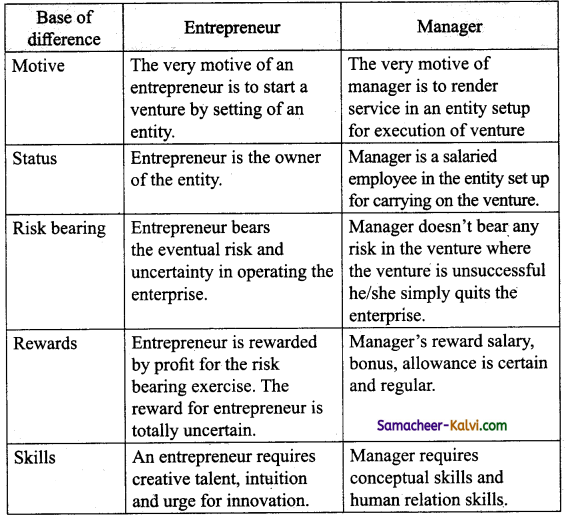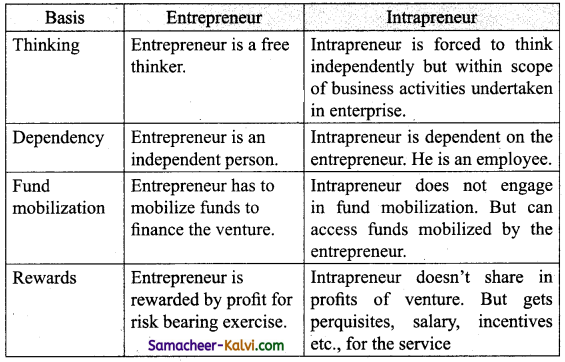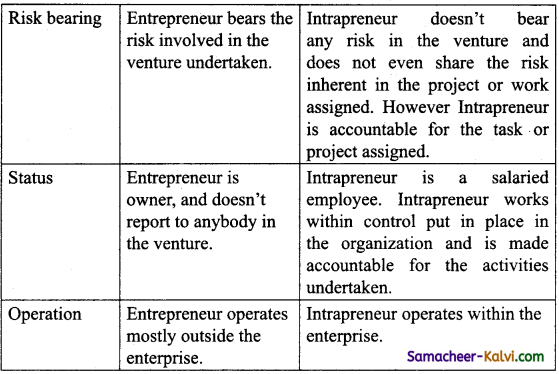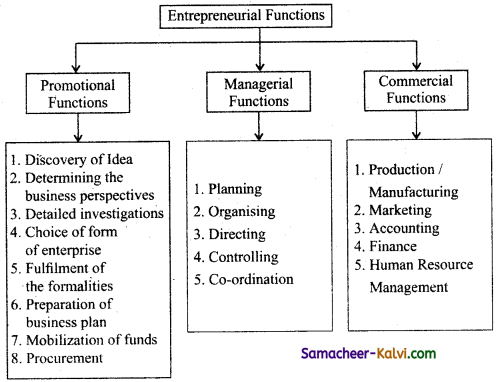TN State Board 12th Commerce Important Questions Chapter 23 Elements of Entrepreneurship
Question 1.
Mention any two features of entrepreneurs.
Answer:
- Spirit of enterprise
- Innovation
- Resource mobilization
Question 2.
List down the managerial functions of entrepreneurs.
Answer:
- Planning
- Organising
- Directing
- Controlling
- Coordination
![]()
Question 3.
List down the promotional functions of entrepreneurs.
Answer:
- Discovery of Idea
- Determining the Business Objectives
- Detailed Investigation
- Choice of form of Enterprise
- Fulfillment of the Formalities
- Preparation of Business Plan
- Mobilization of Funds
- Procurement of machines and materials.
Question 4.
Define Intrapreneur.
Answer:
Intrapreneur is one who thinks and acts like an entrepreneur for the firm’s development during the course of employment in an organization. An intrapreneur is described to be an inside entrepreneur or an entrepreneur.
![]()
Question 5.
List the problems faced by the women entrepreneurs.
Answer:
- Problem, of Finance
- Limited Mobility
- Lack of Education
- Lack of Network support
- Stiff Competition
- Sensitivity
- Lack of Information
- Dependent Culture
Question 6.
Define Entrepreneur.
Answer:
- Entrepreneurship generates employment opportunities for many people besides providing self employment to the entrepreneur.
- The concept of entrepreneur is intimately connected with three core elements namely risks bearing, organizing and innovating.
- In the words of A.H.Cole, “The purposeful activity of an individual or group of associated individuals, undertaken to initiate, maintain or earn profits by production and distribution of economic goods and services”.
![]()
Question 7.
Distinguish between entrepreneur and Manager.
Answer:

Question 8.
List down the commercial functions of Entrepreneur and explain them shortly.
Answer:
(i) Production or manufacturing:
The efficient and effective performance of production function depends on the proper production planning and control to a major extent.
(ii) Marketing:
The very success of marketing function is very much linked with selection of appropriate marketing mix.
(iii) Accounting:
Entrepreneur has to arrange to prepare trading and profit and loss account inorder to know the profit or loss incurred out of operation of the business.
(iv) Finance:
Entrepreneur has to take decisions like choosing the right type of financing.
(v) Human resource management:
He has to estimate the man power needs of the enterprises.
![]()
Question 9.
Explain the promotional functions of entrepreneur.
Answer:
(i) Discovery of Idea:
A person may conceive his own ideas or develop the ideas contributed by others.
(ii) Determining the Business Objectives:
He has to develop objectives in the backdrop of nature of business and type of business activity.
(iii) Detailed Investigation:
He has to analyze in detail the product purpose to produce.
(iv) Choice of form of Enterprise:
There are various forms of organization. He has to choose the appropriate form of organization.
(v) Fulfillment of the formalities:
He has to take necessary step to establish the form of organization chosen.
(vi) Preparation of Business Plan:
Business plan helps entrepreneur to achieve various objectives formulated within specified period of time.
(vii) Mobilization of Funds:
He has to take steps to mobilize capital needed to implement the venture.
(viii) Procurement of machines and materials:
He has to locate the various sources of supply of machineries, equipments and materials.
![]()
Question 10.
Explain the commercial functions of entrepreneur.
Answer:
(i) Production or manufacturing:
Entrepreneur has to take decision relating to selection of factory site and layout, type of products to be manufactured, research and development.
(ii) Marketing:
Entrepreneur has to carry out following functions pertaining to marketing aspects namely consumer research, product planning, standardization packaging, pricing, warehousing, distribution, promotion.
(iii) Accounting:
Entrepreneur has to arrange to prepare trading and profit and loss account in order to know profit or loss. He is also prepared to ensure the adequacy of funds and cash for meeting various working capital needs of the business.
(iv) Finance:
An entrepreneur has to take decisions like choosing the right ‘ type of financing, framing the best dividend policy, wealth etc.
(v) Human resource management:
After determining the required man power, the entrepreneur has to organize the performance of following functions pertaining to human resources namely recruitment, selecting, compensation structure and incentives and safety mechanism and social security programmes.
Question 11.
How do you Classify entrepreneurs.
Answer:
Entrepreneurs are now broadly classified into three groups namely risk bearer, organizer and innovator.
(i) Entrepreneur as a risk bearer:
Entrepreneur act as an agent combining all factors of production to produce a product or service in order to sell at uncertain price in future.
(ii) Entrepreneur as an organizer:
An entrepreneur faces a deal of obstacles and misfortunes and undergoes mental agony and anxieties in the process of organizing any venture. In sum, entrepreneur is described to be an organizer.
(iii) Entrepreneur as an innovator:
Joseph A. Schumpter, in the year 1934, used innovation as a criterion to define an individual as entrepreneur. According to him, entrepreneur is one who,
(a) Introduces a brand new product in the market.
(b) Institutes a new technology to produce a product.
(c) Discovers new course of supply of new materials.
In all the concept of entrepreneur is intimately connected with three core elements namely risk bearing, organizing and innovating.
![]()
Question 12.
What are the characteristics of an entrepreneur?
Answer:
(i) Spirit of enterprise:
Entrepreneur should not get discouraged by setbacks or frustrations emerging during the course of entrepreneurial journey.
(ii) Self confidence:
Entrepreneur should have a self confidence in order to achieve high goals in the business.
(iii) Flexibility:
Entrepreneur should change the decisions made already in the light of ever changing business environment.
(iv) Innovation:
Entrepreneurs should contribute something new or something unique to meet the changing requirements of customers namely new product, new method of production or distribution etc.
(v) Resource mobilization:
Entrepreneur should have capability to mobilize both tangible inputs like manpower, technology, market, method etc.
(vi) Leadership:
Entrepreneur should be able to influence team members by showing sympathy and empathy. So as to enable them to contribute positively towards the goals of the venture.
(vii) Analytical ability:
Entrepreneur should take rational decisions after examining the various aspects of a problem.
(viii) Decision making:
Entrepreneur has to take timely and correct decision with regard to nature and type of product to be produced, type of technology to be adapted, location of the enterprises, size of the unit, volume of production and so on.
![]()
Question 13.
Distinguish between an Entrepreneur and an Intrapreneur.
Answer:


Question 14.
Discuss the problems faced by Women Entrepreneurs.
Answer:
(i) Problem of finance:
Because of the limited funds, women entrepreneurs are not able to effectively and efficiently run and expand their business.
(ii) Limited mobility:
The domestic responsibilities do not allow women entrepreneurs to freely move out of business enterprises in connection with business activities.
(iii) Lack of education:
Illiterate and semiliterate women entrepreneurs encounter a lot of challenges in their entrepreneurial jqumey
(iv) Lack of network support:
Women entrepreneurs need much psychological support and wiser counselling especially during the time they actually encounter challenges.
(v) Staff competition:
Women entrepreneurs have to face acute competition for their goods from organized sector and from their male counter parts.
(vi) Sensitivity:
Womens are more prone to a variety of emotions. Being mother, women are vulnerable to many emotions. This trait doesn’t allow women entrepreneurs to take objective decisions in many contacts during the course of running the entrepreneurial venture.
(vii) Dependent culture:
In India, women however educated and talented are groomed to be dependent on their parents, life partners and children during the various phases of their life cycle.
![]()
Question 15.
Explain in detail the various functions of an entrepreneur.
Answer:

![]()
Choose the correct answer:
Question 1.
Which of the below is a factor of production?
(a) Land
(b) Labour
(c) Entrepreneurship
(d) All of the above
Answer:
(d) All of the above
Question 2.
Entrepreneur is not classified as:
(a) Risk Bearer
(b) Innovator
(c) Employee
(d) Organizer
Answer:
(b) Innovator
Question 3.
What are the characteristics of an entrepreneur?
(a) Spirit of enterprise
(b) Flexibility
(c) Self Confidence
(d) All of the above
Answer:
(d) All of the above
![]()
Question 4.
Which of the below is not classified into managerial functions?
(a) Planning
(b) Marketing
(c) Organizing
(d) Controlling
Answer:
(c) Organizing
Question 5.
Which of the below is a commercial function?
(a) Accounting
(b) Coordination
(c) Discovery of idea
(d) Planning
Answer:
(a) Accounting